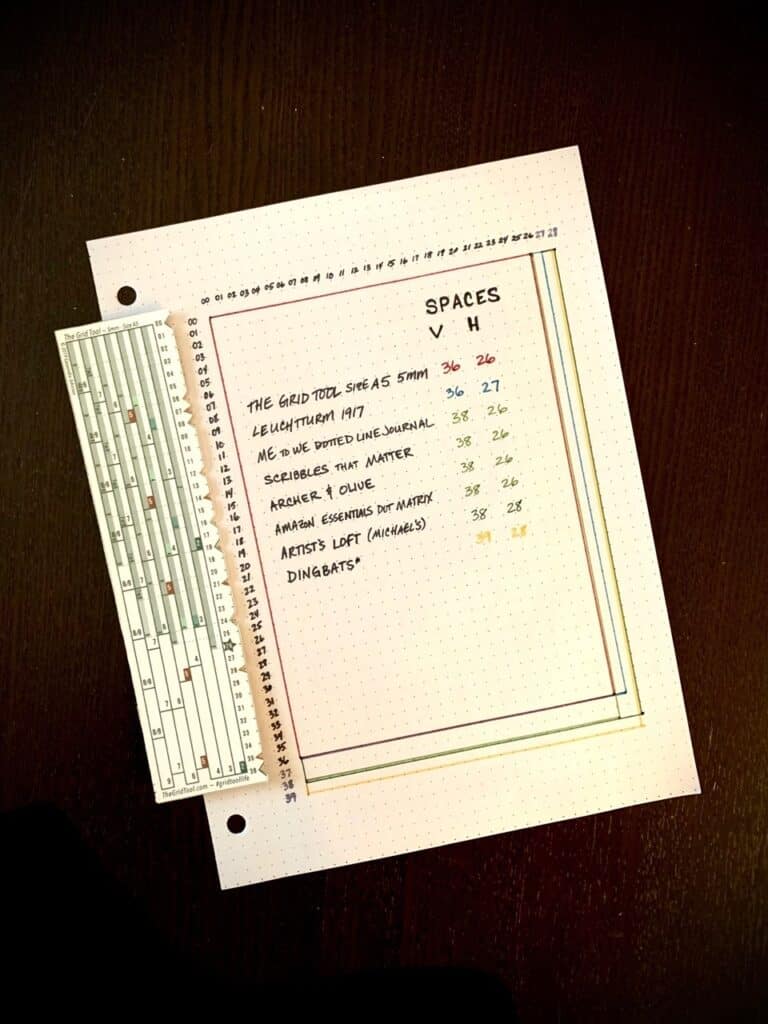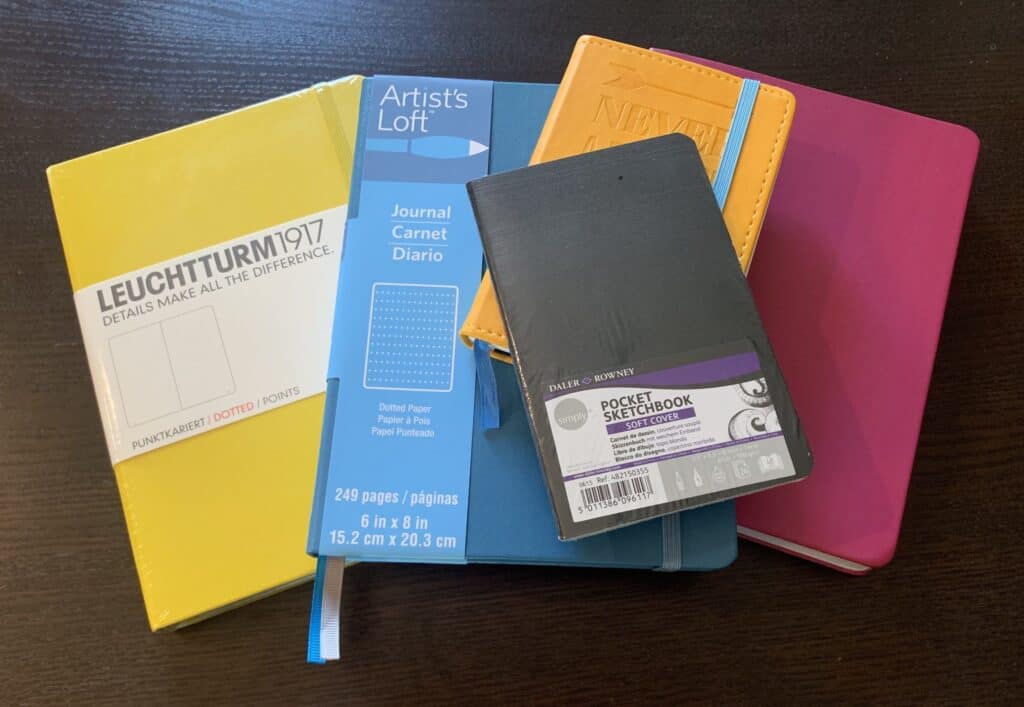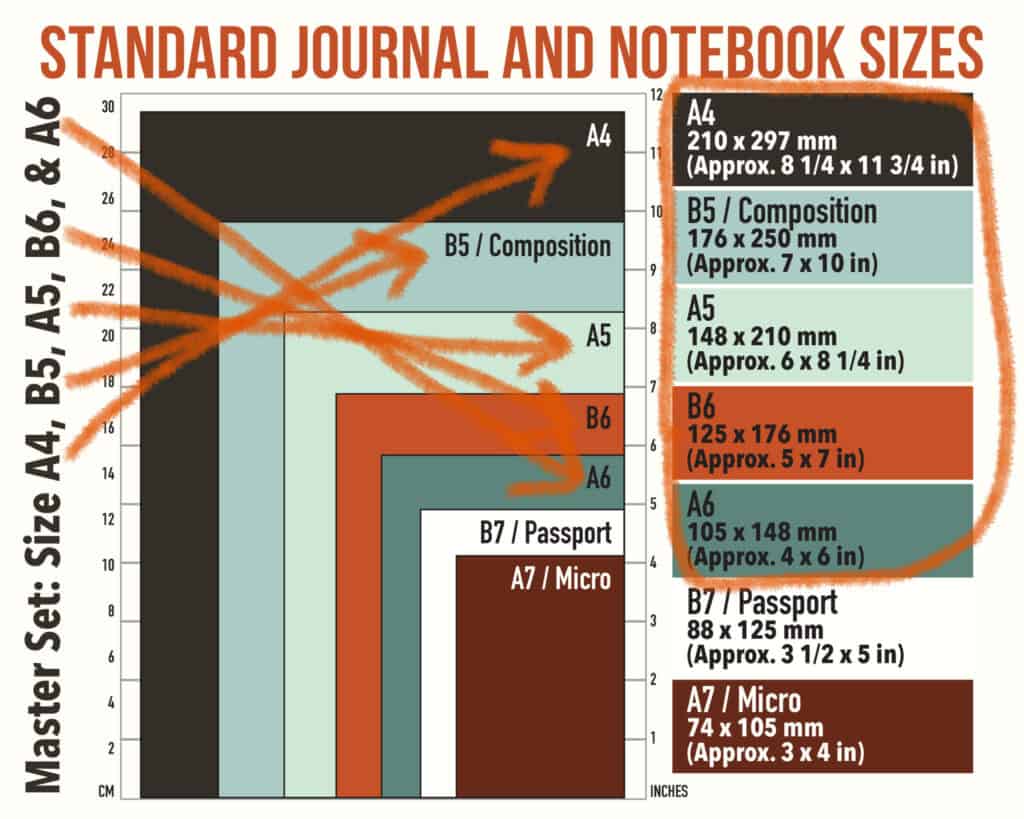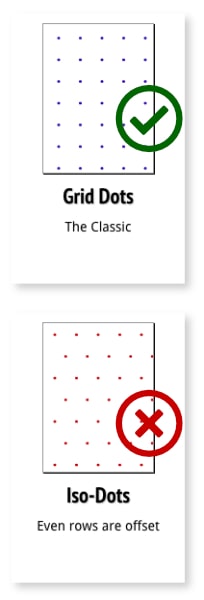“What types of notebooks and journals is The Grid Tool designed for?” is one of the first questions I had to answer in my invention process. I knew the answer would inform and influence all my design decisions going forward. I also knew it was a critical decision to make, and one I could only find the answer to through research and experience.


How the design followed function
When I started my bullet journal journey several years ago, I asked all kinds of questions everyone does at the beginning. Things like,
- “What kind and what size notebook or journal should I use?”
- “How do I set it up?”
- “What tools do I need for bullet journaling?”
and many more.
As time went on and I gained experience, I asked more questions and found that many bullet journal enthusiasts raved about certain notebooks and journals. More often than not, I heard people talk about size A5 and B5 square grid dot journals from brands like Leuchtturm or Michael’s Craft Store brand Artist’s Loft.
I used this information and more to figure out the math involved in sectioning my page into even rows and columns. And, of course, I ran into several problems.


Various Types of Notebooks and Journals
If you’ve ever shopped for a journal or notebook, the first thing you’ll notice is the HUGE variety you have to choose from.
There are different:
- brands
- sizes
- paper types and colors
- printed patterns (line or dot guides) and pagination (page numbers)
- sizes and types of printed patterns
- sizes of page margins (blank space around the edges of each page)
and more!
This is great for creativity – you can pick the notebook or journal you enjoy best. But when you’re trying to create a tool to measure different sizes and configurations of dot journals, it can be ultra-challenging.


Standards are great
Luckily, a few standard dot journal formats have emerged from all this variety.
Notebook and Journal Paper Size
Many dot journals are manufactured close to standard paper sizes. But a couple – A5 and B5 – have become very popular choices for bullet journalers and DIY planners.


Pattern Type
Dot patterns can vary to create squares, triangles, hexagons, and other geometric shapes. I’ve found squares are the most common. And of course, they’re the easiest to add or divide both horizontally and vertically because they’re the same size on all sides.
Pattern Spacing
The space between each dot can vary as well. In the United States, ruled paper typically comes in two line spacing sizes – College ruled and Wide ruled. The space between each line of College ruled paper is slightly smaller than that of Wide ruled. Similarly, the spacing between dots on dotted paper can be 4mm, 5mm, 1/4 inch, or almost any other measurement. I’ve found 5mm is the most common spacing size in most journals preferred by those who bullet journal.
Finding these common threads led me on a path to creating a tool with maximum compatibility for a wide variety of notebooks and journals.
But I still had the problem of keeping track of which notebooks and journals were which. So I had to start a spreadsheet to keep them all straight.
Compiling Types of Notebooks and Journals
From my research, I was happy to find many notebooks and journals are compatible – they just need to match the measurements and dimensions The Grid Tool uses to divide and section.
If you have a commonly available brand of journal or notebook, I may have it listed on my Google Spreadsheet of Notebook Sizes.
Is your notebook or journal in my spreadsheet?
See my Google Spreadsheet of Notebook Sizes – where I’ve listed compatibility with all the different versions and sizes of The Grid Tool.
On each row in my spreadsheet, I’ve added detailed information about many popular brands of notebooks and journals. I’ve included standard paper size, length and height (in imperial and metric measurements), number of dots and spaces, and, of course, The Grid Tool compatibility.
What if my notebook or journal isn’t on the list?
Not on the list? Different than the information I have? Contact Me and let me know about it. I’d like to add as many as I can and help you figure out if The Grid Tool is compatible.
If you’d like to find out for yourself whether or not The Grid Tool will work for you, that’s the subject of another post: Which notebooks or journals does The Grid Tool work with?
